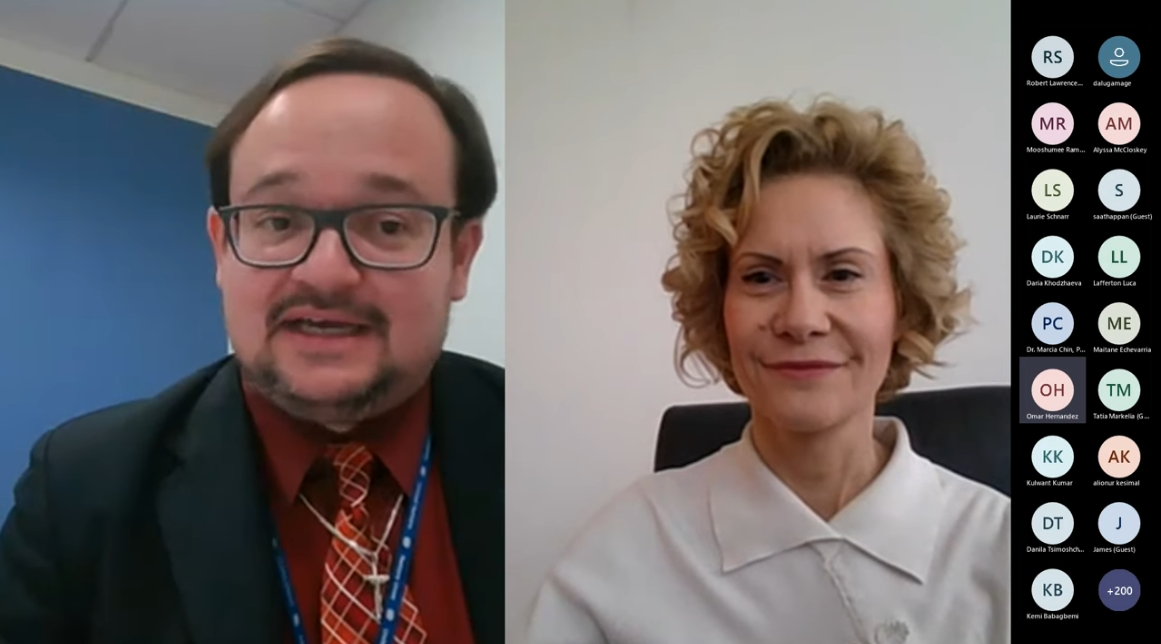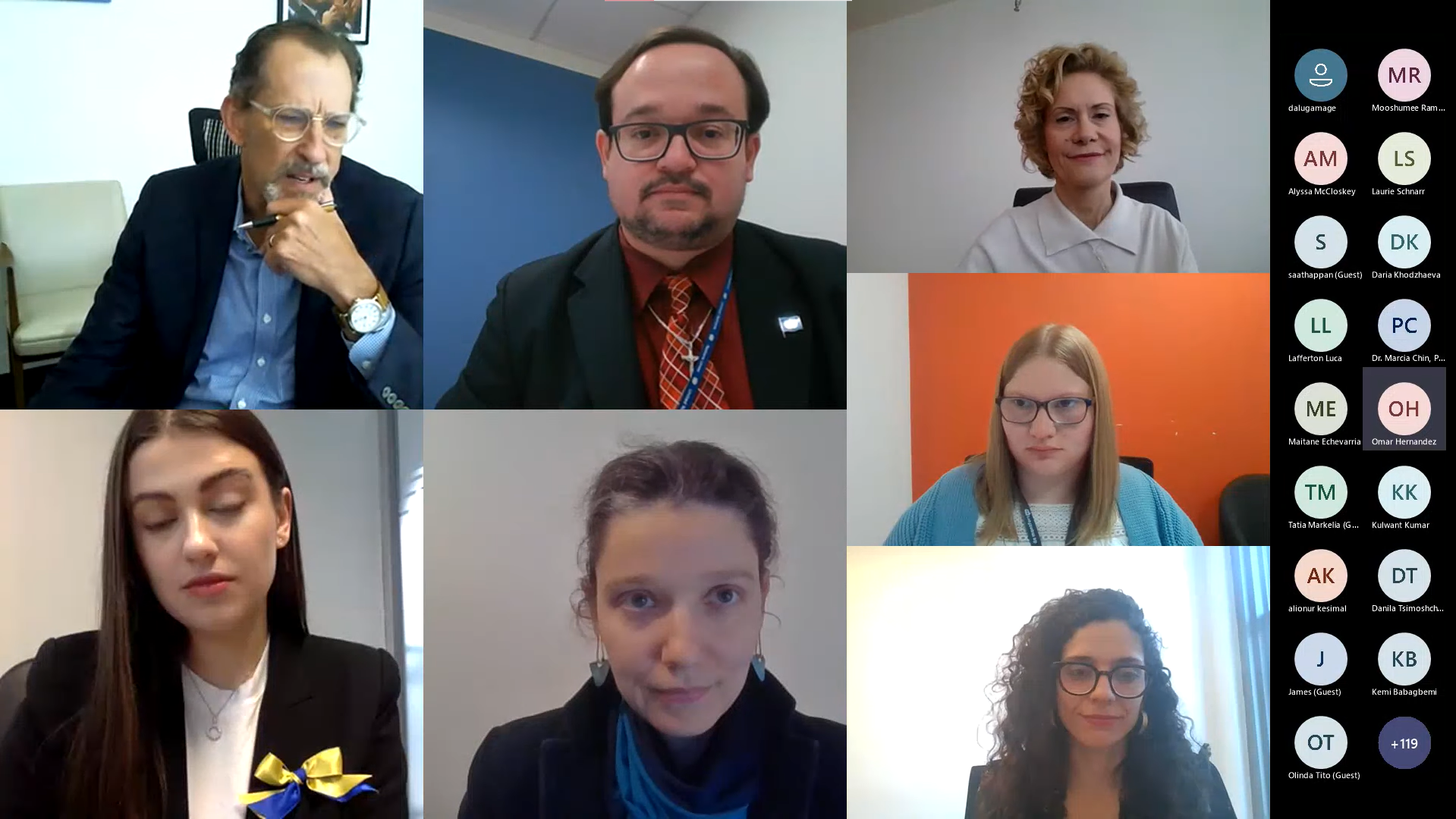Hungary and Széchenyi István University help students fleeing war in Ukraine
Hungary and Széchenyi István University both consider it important to provide emergency, immediate assistance and longer-term support to Ukrainian and international students fleeing Ukraine, enabling them to continue their studies, according to a presentation by Dr Eszter Lukács, Vice-Rector for International Affairs at Széchenyi István University and Chair of the International Committee of the Hungarian Rectors' Conference, at an event organised by the UN Academic Impact (UNAI) programme of the United Nation’s Department of Global Communications.
The UNAI programme of the United Nations Public Relations Office organised an exchange on the response of universities to the humanitarian impact of the war in Ukraine. This, and the Global Communications Department that oversees it, are part of the UN Secretariat, under the responsibility of Secretary-General António Guterres. The online event was moderated by the Program Manager at UNAI, Omar Hernández, with welcoming remarks by Dana Sleiman, Senior Officer at the UN’s High Commission for Refugees in New York, and Robert Skinner, Director of UNAI and Deputy Director and Chief of Partnerships and Global Engagement at United Nations.
At the programme, representatives from the University of Bucharest, Lazarski University in Warsaw and the De Montfort Students' Association in the UK were joined by Dr Eszter Lukács, Vice-Rector for International Affairs of Széchenyi István University and Chair of the International Committee of the Hungarian Rectors' Conference, who gave a presentation on Hungarian assistance to international and Ukrainian students who are refugees from Ukraine. She explained that all higher education institutions in Hungary are cooperating with the Ministry of Foreign Affairs and Trade and the Ministry of Innovation and Technology, which are responsible for coordinating humanitarian efforts. She added that as part of the emergency, immediate assistance, refugees were housed in halls of residence and provided with food, water, clothing and toiletries. Charity donations were also organised for them.
 Omar Hernández, Programme Director of UNAI and Dr Eszter Lukács, Vice-Rector for International Affairs at Széchenyi István University and Chair of the International Committee of the Hungarian Rectors' Conference
Omar Hernández, Programme Director of UNAI and Dr Eszter Lukács, Vice-Rector for International Affairs at Széchenyi István University and Chair of the International Committee of the Hungarian Rectors' Conference
"At Széchenyi István University, we hosted groups of students from India and Nigeria, while apart from these, most of those coming to Hungary were Ghanaian, Egyptian, Iranian, Pakistani and Ukrainian students," said Dr Lukács.
Sixty-three percent of those arriving in Hungary decided to return to their country of origin, while the rest stayed or travelled on to other European countries. The Vice Rector noted that the embassies of the countries concerned in Budapest were able to organise the onward travel of the young people in 3-5 days, so that the temporary accommodation was of significant help to them.
Dr Lukács also reported that in the framework of long-term assistance, students from Ghana, Egypt, Iran, Pakistan and Ukraine were given the opportunity to complete their studies in Hungarian higher education institutions, through the Students at Risk programme. In addition, the European Erasmus programme is available for those who would prefer a shorter course of study: the Hungarian government has offered 500 scholarship places to international students formerly studying in Ukraine and 500 to Ukrainian students. The Vice Rector also said that 79% of refugees choosing to study in Hungary had previously studied medicine in Ukraine, while the remaining 21% had studied dentistry, pharmacy, engineering, economics and IT. Széchenyi István University is offering to admit students on five Bachelor's and nine Master's degrees in economics, agriculture and engineering.
By way of comparison, Dr Eszter Lukács said that there are currently 39,000 international students studying in higher education institutions in Hungary, which will rise to 40,000 with the addition of students from Ukraine. The total number of students in Hungarian higher education is currently 273,000 with 99,000 attempting to get into a university in the current admission procedure. "This means that the quota offered to students who are refugees from Ukraine represents one per cent of new applicants seeking to enter the Hungarian higher education system," stressed the Vice Rector.
 A snapshot of the event (clockwise, starting from the top left corner): Robert Skinner, Deputy Director and Chief of Partnerships and Global Engagement at the United Nations and UNAI Director, Omar Hernández, Public Information Officer and Program Manager at UNAI, Dr Eszter Lukács, Vice Rector for International Affairs at Széchenyi István University and Chair of the International Committee of the Hungarian Rectors' Conference, Filippa Manning, Student Volunteering Coordinator, De Montfort University, UK, Dana Sleiman, Senior Communications Officer, UNHCR New York, Luciana Ghica Director, Centre for International and Development Studies, University of Bucharest and Daryna Petryk, Student Support Services, Lazarski University.
A snapshot of the event (clockwise, starting from the top left corner): Robert Skinner, Deputy Director and Chief of Partnerships and Global Engagement at the United Nations and UNAI Director, Omar Hernández, Public Information Officer and Program Manager at UNAI, Dr Eszter Lukács, Vice Rector for International Affairs at Széchenyi István University and Chair of the International Committee of the Hungarian Rectors' Conference, Filippa Manning, Student Volunteering Coordinator, De Montfort University, UK, Dana Sleiman, Senior Communications Officer, UNHCR New York, Luciana Ghica Director, Centre for International and Development Studies, University of Bucharest and Daryna Petryk, Student Support Services, Lazarski University.











